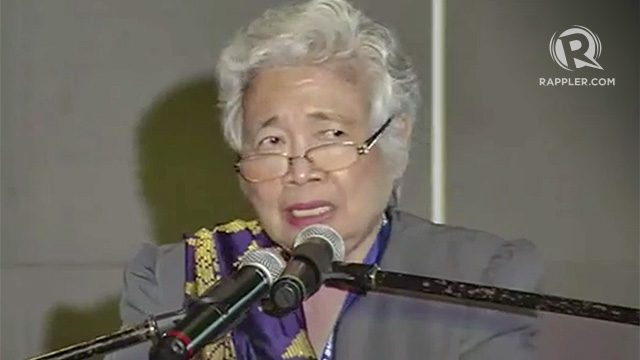SUMMARY
This is AI generated summarization, which may have errors. For context, always refer to the full article.

MANILA, Philippines – The Commission on Human Rights (CHR) is reviewing competencies of human rights education in the K to 12 curriculum.
Education Secretary Leonor Briones revealed this during the first day of the Education Summit 2016 on Thursday, November 3.
“The Commission on Human Rights, I am told, is also reviewing the competencies in the K to 12 curriculum,” she said, answering a question from the crowd on her department’s role in the full implementation of Republic Act 10368 or the Human Rights Victims Reparation and Recognition Act of 2013.
Under the law, the Department of Education (DepEd) is mandated to work with the Commission on Higher Education and the Human Rights Violations Victims’ Memorial Commission to make sure that the curricula from basic to tertiary education include teachings on Martial Law atrocities, and the lives and sacrifices of human rights victims.
DepEd has already committed to a curriculum change that will show the “complete” picture of Martial Law, including the “corruption and human rights abuses” during that time.
Before Briones took office, she had said that her department’s review of history books will cover the administration of all Philippine presidents, and not just that of the late strongman Ferdinand Marcos.
‘Citizens of the world’
On Thursday, the education secretary talked briefly about her department’s policies on protecting the rights of the child, gender equality, and bullying.
In her speech, Briones said DepEd looks at human rights “as really the framework of all that we are doing.”
“This is also very clearly stated in the UNESCO statement that education is not only about history, about culture, about technology, but it also has a strong moral and ethical foundation. This is why everybody wants to have a part [in] education because of the ethical aspects. And ethics, morals, involve, of course, human rights, and that we commit to and we recognize,” she added.
She reminded education stakeholders to raise learners to be citizens of both the Philippines and the global society.
“Do not forget that they are Filipinos, that they have a unique history, that they have a language that they can speak and communicate with each other and with the rest of the world,” Briones said.
According to her, being a citizen of the world means being able to “deal with other countries with dignity.”
The Education Summit 2016 will end on Friday, November 4. The focus of the two-day summit is crafting the Duterte administration’s education agenda. (READ: TESDA chief: PH training centers need repairs, new equipment) – Rappler.com
Add a comment
How does this make you feel?
There are no comments yet. Add your comment to start the conversation.